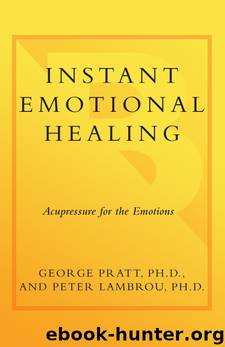Instant Emotional Healing by George Pratt

Author:George Pratt [Lambrou, Peter]
Language: eng
Format: epub
ISBN: 978-0-307-48631-8
Publisher: Crown Publishing Group
Published: 2000-03-14T16:00:00+00:00
Feelings of embarrassment, guilt, and shame are often closely related. If you have doubts as to which you are feeling, choose the one you believe is the most relevant. If that treatment sequence does not work, you may need to try another.
Grief, Sadness, and Regret
Grief,sadness,and regretspan a broad spectrum of feelings. In some situations all of these emotions are reasonable and necessary responses. Feeling the heavy hand of grief after a big loss is normal; it provides a way of coming to terms with drastic changes in one’s life. Feeling regret allows us to convey remorse. If we felt no regret or disappointmentat doing poorly at some task, we would not be motivated to take action to change our behavior. Prolonged sadness and grief, however, can lead to depression. Clinical depression, however, is a serious and often complex condition that should be assessed and treated by a medical or mental health professional. Any thoughts of harming yourself are clear signals to seek professional help and guidance immediately.
As with all emotions, the appropriateness of the response is what concerns us. There are times when sadness serves no productive purpose and merely holds us back in some way. Sadness can turn to negativity,an outlook that colors even positive events, highlighting instead the deficits and flaws. When negative thinking arises, very frequently correcting polarity reversals will resolve these feelings. Once the negative thoughts are cleared away, the target emotions can be resolved with the specific tapping sequences.
Griefarises from a loss. The word “grief” stems from the same root as grave, severe; heaviness and sorroware the companions of grief. Profound grief usually is associated with the loss of a loved one who will be deeply missed. The grieving process honors the memory of the lost loved one and allows the individual to process the pain of the loss. Grief reveals the value of life and makes us aware of the bonds between people. We grieve as well the loss of a job, a good friend moving away the loss of our health or a beloved home or pet. The fatigueand lethargythat often accompany grief reflect the body’s suffering as well and afford time for reflection that can serve somehow to incorporate the loss into one’s life. Grieving is a natural process for healing pain. When we do not go through the process of grieving a serious loss, we risk becoming disoriented and disconnected from life.
Most experts have found grief to follow a fairly predictable path that has been described by Elisabeth Kübler-Ross, M.D., as having six stages: denial, anger over the loss, bargaining with God to reverse the loss, depression and sorrow, acceptance, and eventually hope for the future.
The stages are not distinct. They frequently overlap, and a person may move from one to another and then back again. Gerald Koocher, Ph.D., chief psychologist and grief expert at Boston’s Children’s Hospital, believes that a person may grieve for the loss of a loved one for up to two years before a noticeable change occurs. The grief may continue naturally off and on for many years following, but with decreasing intensity.
Download
This site does not store any files on its server. We only index and link to content provided by other sites. Please contact the content providers to delete copyright contents if any and email us, we'll remove relevant links or contents immediately.
Becoming Supernatural by Dr. Joe Dispenza(7112)
Tools of Titans by Timothy Ferriss(6956)
The Witchcraft of Salem Village by Shirley Jackson(6586)
Inner Engineering: A Yogi's Guide to Joy by Sadhguru(5904)
The Four Agreements by Don Miguel Ruiz(5519)
The Power of Now: A Guide to Spiritual Enlightenment by Eckhart Tolle(4761)
The Wisdom of Sundays by Oprah Winfrey(4631)
Room 212 by Kate Stewart(4111)
Fear by Osho(4089)
Pale Blue Dot by Carl Sagan(4014)
The David Icke Guide to the Global Conspiracy (and how to end it) by David Icke(3889)
Rising Strong by Brene Brown(3786)
Animal Frequency by Melissa Alvarez(3757)
How to Change Your Mind by Michael Pollan(3681)
Sigil Witchery by Laura Tempest Zakroff(3656)
Real Magic by Dean Radin PhD(3572)
Secrets of Antigravity Propulsion: Tesla, UFOs, and Classified Aerospace Technology by Ph.D. Paul A. Laviolette(3479)
The Art of Happiness by The Dalai Lama(3389)
Man and His Symbols by Carl Gustav Jung(3323)
